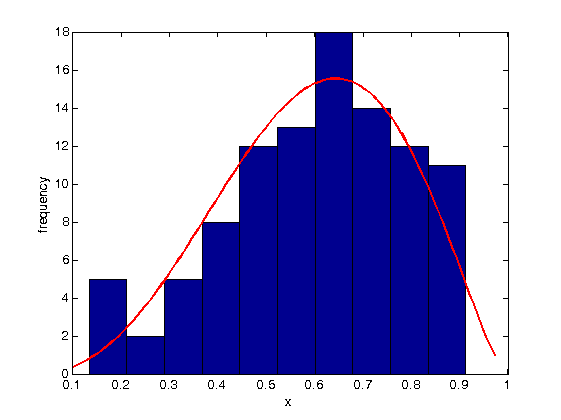I ask, because it is very hard to find information regarding the beta distribution and the bayesian inference, where the beta distri is NOT the prior.
My goal is to identify or to improve the two parameters $\alpha$ and $\beta$ of a fitted beta distribution from binned data with the pdf
$ f(x|\alpha,\beta)=\frac{1}{\text{B}(\alpha,\beta)} x^{\alpha-1}(1-x)^{\beta-1} $.
My first attempts to estimate the parameters is the method of moments, see http://en.wikipedia.org/wiki/Beta_distribution#Method_of_moments .
This works fine. But if the parameters are varying by time, what can I do? I thought of a mean/variance update and another use of the moments method. But can I update the mean and the variance each time a new measurement is coming, only with the old values of the mean and variance? And how can I weight the new data, so that my "offline" estimated parameters are more important? I couldn't find a solution so I thought maybe bayesian updating be the trick.
Assume, $\alpha$ and $\beta$ are the parameters $\theta$. Is there a way to estimate them? The problem is, my new data is only a "bin".
For example: I've got a variable $X_k$, where k is the discrete time. $X_{k+1}=f(X_k|\alpha,\beta)$ is a function of the beta pdf. $\alpha$ and $\beta$ are estimated from following measurements:

The parameters are estimated with moment matching. Then later I get new data. But only a count more at e.g. bin number 2. And then another measurement at bin 5 etc. After 100 measurements or so (or maybe at each measurement), I'd like to update the parameters. But I don't have the initial data anymore, since it need a lot of memory. Can that be done somehow?
Thank you very much!
